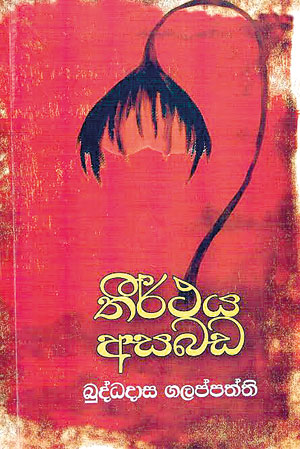Verses that show his versatility in the use of words
View(s): How can I wait without sending a letter, Duwa
How can I wait without sending a letter, Duwa
when I have no news from you for days?
The telephone you gave
for me to talk in an emergency
has not worked for days
May be the batteries are down
I have no knowledge of these
I was shaken up last night
when neighbour Dayawathie nanda
told me she saw you in the ‘televison’
Until they showed the news in the night again
I was up my dear ‘duwa’
I saw how they assaulted you
like ‘marayas’ using poles
Why my dear girl
did you get involved?
Dayawathie ‘nanda’ saw
my eyes filled with tears
Don’t cry ‘nande’
she has no problem
Tears in the eyes will dry up
my dear girl
but tears in the mind continue to flow
My innocent girl without the father
For them to beat you mercilessly
what did you do my ‘duwa’
What is the use of your studying
Come home tomorrow itself
They are looking for more females
to work in the quarry these days
I have attempted to translate a very moving poem by the veteran poet Buddhadasa Galappatty (Buddhi as he is fondly referred to) in his latest anthology of poems, Theerthaya Asabada’ (In the vicinity of the ferry). The poem’s title ‘Gamenliyumakavilla’ took me back to the 1970s when Clarence Wijewardena sang that beautiful song of a sister writing to the brother – a song I liked very much for its simple words, lovely melody and of course, the singing (all done by Clarence). What she wrote was so innocent. Buddhi’s poem is equally appealing. It, however, illustrates how things have changed. Thuggery is now the order of the day. He cleverly sums up the anxiety of the mothers who have sent their children for higher studies.
As Buddhi admits in the Author’s Note, he has not published a book of poems for nearly a decade. His reason is that it is a tough job to write verse. He should know having done it for so many years. Judging from the poems in newspapers and journals many may argue he is wrong. But obviously he looks for quality.

Buddhadasa Galappatty
Glancing through his latest effort, one realises his versatility in the selection of words to suit the different themes he handles in his poems. His is a wide canvas both in the selection of his subject matter as well as the style of writing. His knack for creating a visual in the reader’s mind of what he writes about is remarkable. ‘Cricket loverly cricket’ vividly describes a typical match situation: ‘The batsman is on the verge of getting his maiden century. The spectators cheer. The bowler is determined to bowl him out. He targets the middle wicket. He succeeds. The dejected batsman walks back. Umpire decides it’s a no ball.’ Buddhi sees the mix of sorrowful tears and joyful tears. ‘Life is constantly amidst tears’ is his verdict.
Buddhi is a keen observer of life. Of the 40+ poems in ‘Theerthaya’, most describe true to life situations which make him ‘a poet of the people’. No wonder the fans kept worrying him when he stopped writing poetry.
The pain of mind he had obviously experienced hearing tragic stories is well illustrated in ‘Lakmavun Velapuma’ (Lament of mothers) based on the news story of how a mother tried to commit suicide by jumping into the Kalu Ganga with her little son. ‘Kiribath’ describes the irony of celebrating victory by soldiers after crushing the enemy while a fellow soldier had lost his life.
| Book facts: Theerthaya Asabada’ (In the vicinity of the ferry) by Buddhadasa Galappatty. Reviewed by D.C. Ranatunga |
Buddhi’s human interest poems touch the reader’s heart. He picks on a simple happening and turns it into beautiful poems. ‘Veedipahan dalvanna’ describes how we miss the guy who comes at dusk to switch on the street lights when he does not turn up. After three days a person drops in at his place one late evening. He learns thathe is down with fever. The house is in darkness. He asks the daughter why. ‘Mother has gone to the boutique to bring kerosene’, she replies. Here again through the words he uses, he creates a picture of how the guy rides his cycle with a pole and lights up the whole street. When the visitor goes to his place he parks his cycle and enters the house. In just five words – ‘Papediya gaalkota –godawadie ohu nivasata’ the picture is created. The minute details he goes into make such a difference.
The observations of an elephant on it way to the Esala Perahera in Kandy is fascinating. So is the gossip among friends in a poem where he uses the title in English ‘Back to School’. He cleverly uses ‘Singlish’ to discuss the chatter among the boys in the poem written in free verse.
The mix of styles and the selection of words to suit each poem in ‘Theerthaya’ show his skill as a mature poet – his fans are justified in clamouring for more and more.
Though Buddhi did not write poetry for some time, he has been a regular columnist in Sinhala newspapers for many years. His columns – mainly on the arts of which he has a wide knowledge and experience – are eagerly looked forward to by the readers. They enjoy when he discusses controversial issues as he did recently on how the Sunil Santha memorial lecture dragged on.
Meanwhile, he has also published the second volume of ‘Kavimihira’ – an anthology of 36 poems by upcoming poets selected by him from the weekly literary page in the ‘Divaina’. Buddhi carries a critical appreciation of each selected poem. This is of much value to them.
Both anthologies are neatly presented by Sarasavi Publishers and they are interesting reading indeed.


